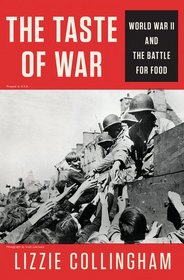Search -
The Taste of War
The Taste of War
Author:
A sweeping history, showing the surprising role that food played in World War II and its aftermath. In this richly detailed history, Lizzie Collingham reveals how control of food and its production shaped the events of World War II. At least twenty million people died from starvation, malnutrition, and its associated diseases during the war, a... more »
Author:
A sweeping history, showing the surprising role that food played in World War II and its aftermath. In this richly detailed history, Lizzie Collingham reveals how control of food and its production shaped the events of World War II. At least twenty million people died from starvation, malnutrition, and its associated diseases during the war, a... more »
ISBN-13: 9781594203299
ISBN-10: 1594203296
Publication Date: 3/29/2012
Pages: 656
Rating: ?
ISBN-10: 1594203296
Publication Date: 3/29/2012
Pages: 656
Rating: ?
0 stars, based on 0 rating
Publisher: Penguin Press HC, The
Book Type: Hardcover
Members Wishing: 1
Reviews: Amazon | Write a Review
Book Type: Hardcover
Members Wishing: 1
Reviews: Amazon | Write a Review
Genres:
- History >> Military >> World War II
- History >> World
- Science & Math >> Agricultural Sciences >> Food Science




